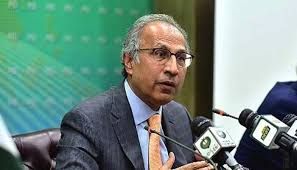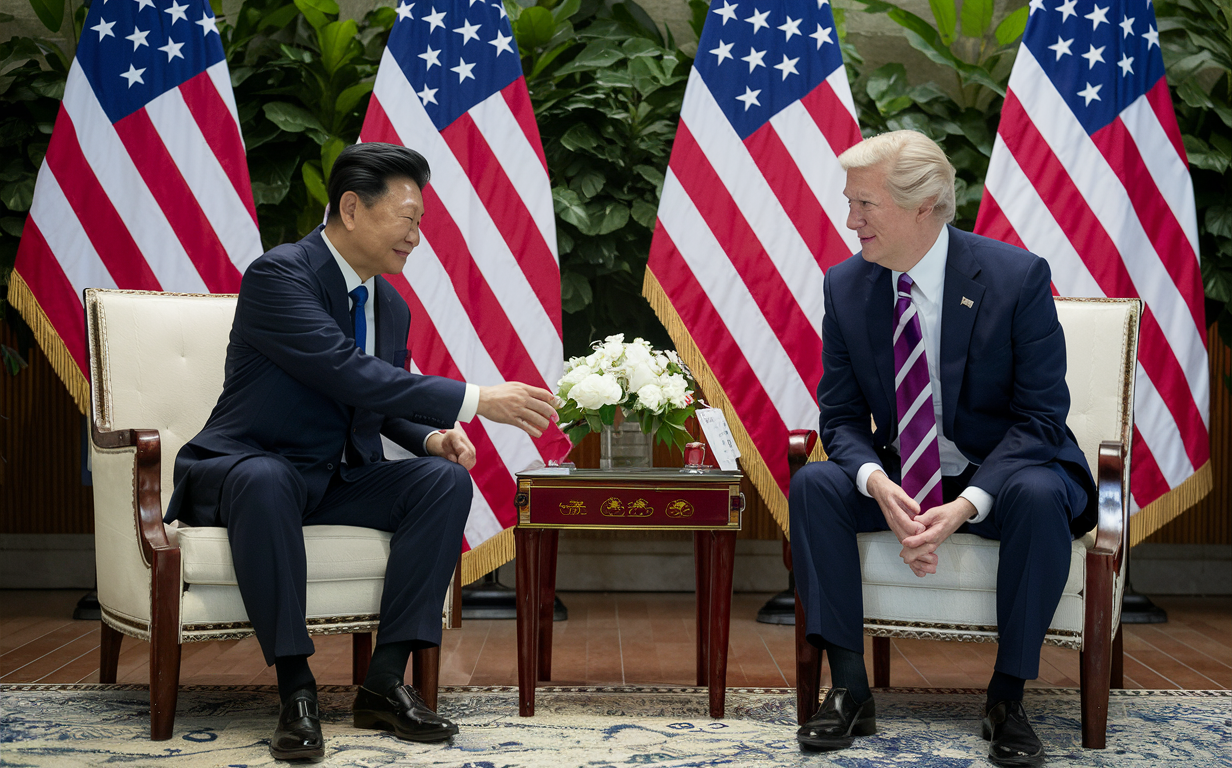China
The World to save developing countries from recession caused by COVID-19 : Hafeez

ISLAMABAD :Adviser to the Prime Minister on Finance and Revenue Dr Abdul Hafeez Shaikh Tuesday expressed the hope that financial and other forums of the world would be able to come up with a plan, enabling developing countries like Pakistan to meet their international obligations and provide relief to the population adversely effected by COVID-19 pandemic.

Talking to Ambassador of China, Yao Jing, who called on him here, he said keeping in view the present circumstances, the World Bank (WB), International Monetary Fund (IMF) and G-20 countries were talking about debt relief, without which developing countries would be worst affected.
He said Pakistan looked forward to Chinese support in dealing with this unprecedented situation arising because of this pandemic.
The advisor welcomed the ambassador and thanked the Chinese government for all the assistance it had provided so far to Pakistan in dealing with the COVID-19 pandemic.
He also shared with the ambassador the details of the economic relief package given by the government to the people whose lives and businesses were affected by the pandemic.
He said during this difficult time, the government had three major priorities including provision of healthcare and safety to its people, cash assistance to the most vulnerable and keeping the wheel of the economy moving in slow but steady pace.
The government, he said, had come up with a comprehensive relief package of worth Rs1.2 trillion, which included, Rs200 billion assistance for workers and labourers, Rs100 billion for supporting SME and agriculture sector, Rs107 billion as sales tax refunds and Rs50 billion income tax refunds from 2014 onward.
Moreover, Ehsaas Programme, through its urgent cash disbursement, was taking care of the most vulnerable in the country.
He said the reduction in petrol and diesel prices and deferment of payment of bills were some other significant steps. Incentivizing the construction sector was also an opportunity for those who were in need of work.
The adviser also discussed with the ambassador about the effect of the coronavirus pandemic on the overall growth of the economy of the country as exports and remittances would both suffer as the global economies were in recessionary phase.
He said different economies had different levels of strength to deal with the economic losses and the developing countries would be the worst hit by the impact of this slow down.
China
German leader’s China trip criticised for prioritising business interests over Brussels’ de-risking agenda

German Chancellor Angela Merkel’s recent trip to China has sparked controversy and criticism. Many are unhappy with her apparent prioritisation of German business interests over supporting Brussels’ de-risking agenda. In public remarks during the trip, Merkel did not voice support for the EU’s efforts to limit economic dependence on China, instead focusing on promoting German businesses and their interests in the country.

Some have called Merkel’s approach a “disaster” and “regrettable”, arguing that it sends the wrong message to China and undermines the EU’s efforts to reduce its economic reliance on the country. Critics have accused Merkel of prioritising short-term economic gains over long-term strategic interests, and of failing to adequately address issues such as human rights abuses in China.
The controversy surrounding Merkel’s China trip highlights the complex relationship between Europe and China, and the challenges facing the EU as it seeks to balance economic interests with strategic concerns. As tensions between the US and China continue to escalate, the EU faces pressure to take a more assertive stance on issues such as trade, human rights, and security.
Table of Contents
Chancellor’s Controversial China Visit

Criticism of German Leader
German Chancellor’s recent visit to China has been met with criticism from some quarters. Critics have accused the Chancellor of prioritizing German business interests over the de-risking agenda of Brussels. In her public remarks in China, the Chancellor did not throw her support behind the European Union’s agenda of reducing risks associated with China’s Belt and Road Initiative.
The critics have argued that the Chancellor’s visit was a missed opportunity to promote the interests of the European Union. They have raised concerns that the Chancellor’s focus on German business interests could undermine the EU’s efforts to address the risks associated with China’s Belt and Road Initiative.
Focus on Business Interests
During her visit to China, the Chancellor focused primarily on promoting German business interests. She led a delegation of German business leaders to China and signed several trade agreements.
The Chancellor’s focus on business interests has been praised by some as a pragmatic approach to promoting German economic growth. However, others have criticized her for ignoring the EU’s de-risking agenda and failing to promote a united front against China’s Belt and Road Initiative.
Overall, the Chancellor’s visit to China has been a subject of controversy. While some have praised her for promoting German business interests, others have criticized her for failing to support the EU’s de-risking agenda.
EU De-Risking Agenda and German Stance

Lack of Support for Brussels
During her recent trip to China, German Chancellor Angela Merkel did not throw her support behind the European Union’s (EU) de-risking agenda. This agenda aims to reduce the EU’s dependence on China and mitigate the risks associated with economic engagement with the country. Merkel’s lack of support for this agenda has drawn criticism from some quarters.
The de-risking agenda was introduced in response to concerns about China’s human rights record, as well as its economic practices, such as the theft of intellectual property. The EU aims to reduce its dependence on China by diversifying its economic partnerships and investing in domestic industries. Merkel’s failure to endorse this agenda has raised questions about Germany’s commitment to the EU’s broader goals.
Implications for EU-China Relations
Merkel’s focus on German business interests during her trip to China has been seen as a sign of Germany’s increasing economic dependence on China. This has raised concerns about the potential implications for EU-China relations. Some experts have suggested that Merkel’s stance could undermine the EU’s efforts to present a united front on issues such as trade and human rights.
Moreover, Merkel’s failure to support the EU’s de-risking agenda could make it more difficult for the EU to negotiate with China on issues such as market access and intellectual property protection. This could have negative implications for both the EU and Germany, as China is an important market for German businesses.
In conclusion, Merkel’s lack of support for the EU’s de-risking agenda and her focus on German business interests during her recent trip to China have raised questions about Germany’s commitment to the EU’s broader goals. This could have negative implications for EU-China relations and make it more difficult for the EU to negotiate with China on key issues.
Reactions and Consequences

Domestic Response
The German Chancellor’s China trip has drawn criticism from various domestic quarters. Critics have accused the Chancellor of prioritizing German business interests over the EU’s de-risking agenda. The opposition parties have been particularly vocal in their criticism, with some accusing the Chancellor of undermining EU unity.
The SPD, the junior partner in the governing coalition, has called for an urgent debate in the Bundestag to discuss the Chancellor’s China trip. The party’s leader, Saskia Esken, has said that the Chancellor’s remarks in China are “regrettable” and that they do not reflect the EU’s position on China.
International Perspective
The Chancellor’s China trip has also raised concerns among Germany’s EU partners. Some EU officials have expressed disappointment that the Chancellor did not use her visit to throw her support behind Brussels’ de-risking agenda. They have also expressed concern that the Chancellor’s focus on German business interests could undermine the EU’s collective approach to China.
The French President, Emmanuel Macron, has been particularly critical of the Chancellor’s China trip. In a recent interview, he called on Germany to show more solidarity with its EU partners on China. He also criticized the Chancellor for not taking a tougher stance on human rights issues in China.
Overall, the Chancellor’s China trip has sparked a heated debate in Germany and the EU. While some have praised the Chancellor for promoting German business interests, others have criticized her for undermining EU unity and failing to support Brussels’ de-risking agenda.
Analysis
Breaking Down the Xi-Biden Phone Call: A Step Forward in China-US Relations

In a significant development, Chinese President Xi Jinping and US President Joe Biden engaged in a ‘candid’ direct conversation, marking their first call since 2022. This conversation holds immense importance as it comes at a time when tensions between the two global powers have been escalating. Let’s delve into the details of this crucial phone call and its implications for China-US relations.
Table of Contents
Understanding the Context
The backdrop against which this phone call took place is crucial to grasp the significance of the dialogue. Tensions between China and the United States have been on the rise due to various issues ranging from trade disputes to human rights concerns. The need for constructive dialogue between the two leaders has never been more pressing.
Key Points of Discussion
During the phone call, Xi and Biden reportedly discussed a range of topics, focusing on areas where their interests align. This ‘candid’ conversation indicates a willingness on both sides to engage in meaningful dialogue despite the challenges that exist in their relationship.
Progress Made and Areas of Agreement
The fact that progress was achieved in limited areas of aligned interests is a positive sign for China-US relations. This could potentially pave the way for further cooperation on issues of mutual concern such as climate change, global health, and regional security.
Implications for Global Dynamics
The outcome of this phone call has broader implications for the global geopolitical landscape. As two of the most influential countries in the world, any positive developments in China-US relations can have far-reaching effects on international trade, security, and diplomacy.
Analysis of the Tone and Approach
The use of the term ‘candid’ to describe the conversation between Xi and Biden suggests a level of openness and honesty in their exchange. This could indicate a shift towards more transparent communication between the two leaders, which is essential for building trust and resolving differences.
Future Prospects and Challenges
While the phone call signifies a step in the right direction, it is important to acknowledge the challenges that lie ahead. Both China and the US have complex issues to address, and sustaining this momentum towards improved relations will require continued effort and cooperation from both sides.
Conclusion
The recent phone call between Xi Jinping and Joe Biden marks a positive development in China-US relations. By analyzing the key points of discussion, progress made, and implications for global dynamics, we can gain valuable insights into the evolving dynamics between these two global powers. This dialogue sets the stage for future engagement and cooperation, highlighting the importance of constructive communication in navigating the complexities of international relations.
China
Navigating the Economic Transformation: China’s Future Depends on Microeconomic Policies

Introduction
China’s economic growth has been a significant global phenomenon, with its rapid expansion driving global trade and shaping the global economy. However, as China enters a new phase of its economic development, it faces challenges that require a shift in focus from macroeconomic stimulus to microeconomic policies. This article explores the importance of microeconomic policies in China’s future economic growth and the implications for businesses and markets.

I. The Limitations of Macroeconomic Stimulus
- Temporary Boost: Macroeconomic stimulus, such as government spending and monetary policy, can provide a temporary boost to the economy. However, it does not address the underlying structural issues that hinder long-term growth.
- Amplifying Economic Shortcomings: Macroeconomic stimulus can exacerbate economic imbalances and inefficiencies, leading to a more significant correction in the future.
II. The Importance of Microeconomic Policies
- Structural Reforms: Microeconomic policies focus on structural reforms that address the root causes of economic challenges. These reforms can include labor market reforms, regulatory changes, and infrastructure investments.
- Encouraging Business Transformation: Microeconomic policies can create an environment that encourages businesses to transform and adapt to changing market conditions. This can lead to increased productivity, innovation, and competitiveness.
III. The Role of Businesses in China’s Economic Transformation
- Adapting to Market Changes: As China’s economy evolves, businesses must adapt to new market conditions and consumer preferences. This may involve shifting from traditional industries to more innovative and technology-driven sectors.
- Embracing Innovation: To prosper in the new economic environment, businesses must embrace innovation and technological advancements. This can include investing in research and development, adopting new technologies, and fostering a culture of innovation.
IV. Implications for Markets and Investors
- Changing Market Dynamics: As China’s economic focus shifts from macroeconomic stimulus to microeconomic policies, market dynamics will change. Investors should be prepared for a more volatile and uncertain market environment.
- Opportunities for Investors: The shift to microeconomic policies presents opportunities for investors in sectors that benefit from structural reforms and business transformation. These may include technology, healthcare, and environmental sectors.
Conclusion
China’s future economic growth depends on its ability to navigate the complex transition from macroeconomic stimulus to microeconomic policies. This requires a focused effort on structural reforms, business transformation, and a shift towards innovation and technology. As China embarks on this transformation, businesses and investors must adapt to the changing market conditions and seize the opportunities presented by the new economic environment.
-

 Featured3 years ago
Featured3 years agoThe Right-Wing Politics in United States & The Capitol Hill Mayhem
-

 Elections 20241 month ago
Elections 20241 month agoAnalyzing Trump’s Super Tuesday Triumph and Nikki Haley’s Strategic Moves
-

 News2 years ago
News2 years agoPrioritizing health & education most effective way to improve socio-economic status: President
-

 China3 years ago
China3 years agoCoronavirus Pandemic and Global Response
-

 Canada3 years ago
Canada3 years agoSocio-Economic Implications of Canadian Border Closure With U.S
-

 Conflict3 years ago
Conflict3 years agoKashmir Lockdown, UNGA & Thereafter
-

 Democracy3 years ago
Democracy3 years agoMissing You! SPSC
-

 Democracy3 years ago
Democracy3 years agoPresident Dr Arif Alvi Confers Civil Awards on Independence Day























